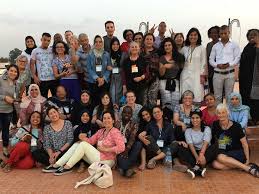African Voices: Re-evaluation Counselling World Conference
By Eze Orduwa
POLITICS DIGEST- “Black Is Beautiful. But I am Not Black!” – Vava Tampa
Between August 9th and 14th, 2022, The International Re-evaluation Co-Counselling Communities held its World Conference on Re-evaluation Counselling. During the conference, there was the policy guideline working group stage during which the issue of the use of the word, “Black” to describe people of African heritage came up. Some participants considered its use in qualifying people of African heritage as out of place and not appropriate. They opined that the use of black is not only narrow, but also somewhat misplaced and may be derogatory if the origins and import of the word is probed. Some viewed its use as a source of white oppression considering its etymology and the dateline it became officially used to describe people of colour.
While opinions held, some other Africans figured that the discussion amounted to not being in unison and in one voice since participants held different views from what was already being used, that is Black Africans Leadership and Community Development (BALCD). They viewed that to continue dwelling on the issue might portray Africans as ‘violent’ in their ways which they said is the general perception of Africans.
Such position was disturbing to me. Does it mean that as a people we do not deserve to contribute on issues affecting us or our voice should not count for fear of being tagged names?
The propriety or otherwise of the use of the word, “Black” rather than simply “Africans” to describe us should be of concern to every person of African heritage no matter where that person is located. A simple research on the internet on the word black shows a sharp difference between its etymology and the present day usage. According to the following source, stackexchange.com, “it traces the history of the term black. The Old English blac was used, like blanc, to refer to a fair person, someone “devoid of colour”. It was only in the 16th century that we saw the semantic change of blac to refer to something dark (night-colour): The word ‘Black’ can be traced back to its proto Indo-European origins through the word ‘blac’ which meant pale, wan, colourless, or albino”.
It was not till the sixteenth century that the semantic broadening of black occurred – both figurative connotations as well as literal.
Read Also:
Further, stackexchange.com stated that “From ‘blac, blake, bleaken, blaccen’ and their literal meaning ‘to bleach out or make white, blond or pale’ came the figurative meaning ‘to stain someone’s reputation, or defame’ or darken. Literally “blac” by that time came to mean night-like colour, dark.” A very dramatic shift indeed. It was also the era, when the Vandals and the Goths were busy writing themselves into history and writing others out of history.
A dig into the deep of the roots of the word black will reveal more to any mind that cares. Its present day usage is not original to people of African heritage. It is coined. If is figurative. It became officially accepted in the 16th century.
As to the shush on divergent views, the essence of the theory of Re-evaluation Counselling which propounded that humans are “powerful” and “good” must be our guiding light always. Otherwise, why must we think that expressing reservation on certain aspects of the guidelines puts us in a way others will see us as violent? And so, in order not to be seen as that, we better keep quiet? Is that what it is? That to me is scary. I do not wish to be cowardly and timid. Such is unbecoming of a human person. It is self-defeating and a sign of self-hate. I find such position absurd.
Studies and research have roundly proven that life on earth began in Africa. Migrations enabled indigenous peoples to get to the nooks and crannies of the world. Africans are everywhere! It is not enough to assert that some people, even though they are of colour, are not of African heritage. Movements, wars, killings, massacres, genocides, slavery, oppressions and other extreme policies of the Caucasians pushed most indigenous populations into obscurity. Africa remains the motherland. And so, it is safe to state that rather than use “Black Africans” to describe me, simply call me person of African Heritage, no matter where I am found on earth, be it in the motherland or in diaspora.
Agreed, some indigenous persons argue that they are not of African heritage, it does not erode the fact of history. Just as Vava Tampa quoted above said in his work published on trtworld.com, “We are not black. No “black” or “negro” has ever existed in Africa. We are Africans.” He further states that, “The terms ‘black’ and ‘negro’ were coined to dehumanise people from the African continent to serve the imperialist and colonial agendas of Europe and the US.” True. History. Go and verify.
As concluded at the World Conference, there is need for continued sessions and working groups on this subject until a more acceptable, all-encompassing word is adopted to describe me and my people, all over the world. I am not black. My identity is not based on the colour of my skin, but of my origin, my essence, my nature, my ancestry, my heritage. I am African.
Eze Orduwa
Enugu, Nigeria
















